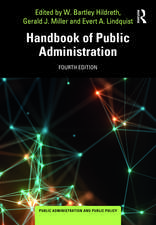The Ombudsman Enterprise and Administrative Justice
Autor Trevor Buck, Richard Kirkham, Brian Thompsonen Limba Engleză Hardback – 28 dec 2010
| Toate formatele și edițiile | Preț | Express |
|---|---|---|
| Paperback (1) | 469.34 lei 6-8 săpt. | |
| Taylor & Francis – 6 mar 2017 | 469.34 lei 6-8 săpt. | |
| Hardback (1) | 1063.41 lei 6-8 săpt. | |
| Taylor & Francis – 28 dec 2010 | 1063.41 lei 6-8 săpt. |
Preț: 1063.41 lei
Preț vechi: 1296.84 lei
-18% Nou
Puncte Express: 1595
Preț estimativ în valută:
203.50€ • 211.26$ • 169.69£
203.50€ • 211.26$ • 169.69£
Carte tipărită la comandă
Livrare economică 25 martie-08 aprilie
Preluare comenzi: 021 569.72.76
Specificații
ISBN-13: 9780754675563
ISBN-10: 0754675564
Pagini: 308
Dimensiuni: 156 x 234 x 19 mm
Greutate: 0.7 kg
Ediția:1
Editura: Taylor & Francis
Colecția Routledge
Locul publicării:Oxford, United Kingdom
ISBN-10: 0754675564
Pagini: 308
Dimensiuni: 156 x 234 x 19 mm
Greutate: 0.7 kg
Ediția:1
Editura: Taylor & Francis
Colecția Routledge
Locul publicării:Oxford, United Kingdom
Cuprins
Contents: Foreword; Preface; Part I Theory and Context: The ombudsman enterprise: an introduction; The constitutional role of the ombudsman; Concepts, theories and policies of administrative justice. Part II The Ombudsman Technique: Putting it right: resolving complaints and assisting citizens; Promoting good administration and helping to get it right. Part III Setting It Right: Independence and accountability: legitimising the ombudsman; Relationships, networks and the administrative justice system; Part IV Conclusion: The 21st century ombudsman enterprise; Appendices; Bibliography; Index.
Notă biografică
Brian Thompson is Senior Lecturer, Liverpool Law School, University of Liverpool. He has published extensively on Administrative and Constitutional Law. He acts a consultant on Public Law to the Northern Ireland Ombudsman, is a member of the panel of specialist advisers to the House of Commons Public Administration select committee which oversees the work of the Parliamentary and Health Service Ombudsman. He was an early advocate of viewing together ombudsmen, complaints tribunals and the courts within an administrative justice framework, and was appointed to the Council on Tribunals in April 2007 and to its successor, the Administrative Justice and Tribunals Council in November 2007.
Richard Kirkham is a Lecturer at Sheffield School of Law, University of Sheffield. He edits the Ombudsman section in the Journal of Social Welfare and Family Law. He has written extensively about the changing roles of the PSO in the UK and has been employed as a consultant by the Parliamentary and Health Service Ombudsman.
Trevor Buck was formerly Professor of Socio-Legal Studies at De Montfort Law School, De Montfort University. His publishing and research interests are in the area of Social Security Law. He conducted a study on the Ombudsmen and social security under a Nuffield Foundation award and was the founding editor of the Ombudsman section in the Journal of Social Welfare and Family Law in 1990. He has conducted a number of funded socio-legal studies for the Department for Constitutional Affairs, the Nuffield Foundation and the National Audit Office.
Richard Kirkham is a Lecturer at Sheffield School of Law, University of Sheffield. He edits the Ombudsman section in the Journal of Social Welfare and Family Law. He has written extensively about the changing roles of the PSO in the UK and has been employed as a consultant by the Parliamentary and Health Service Ombudsman.
Trevor Buck was formerly Professor of Socio-Legal Studies at De Montfort Law School, De Montfort University. His publishing and research interests are in the area of Social Security Law. He conducted a study on the Ombudsmen and social security under a Nuffield Foundation award and was the founding editor of the Ombudsman section in the Journal of Social Welfare and Family Law in 1990. He has conducted a number of funded socio-legal studies for the Department for Constitutional Affairs, the Nuffield Foundation and the National Audit Office.
Recenzii
'This is a timely and important book, providing insight and analysis of the ombudsman enterprise in the UK, and placing ombudsmen very clearly within the wider administrative justice system. It will have significant influence on policy and practice, and is a valuable contribution to the study of ombudsmen.' Mary Seneviratne, Nottingham Trent University, UK 'Scholarly and well-researched, offering an interesting blend of constitutional theory and well-chosen illustrative material, this is an important addition to the literature on administrative justice. It will surely be essential reading, not just for academics working in this field but also for established and developing ombudsman offices around the world.' Gavin Drewry, University of London, UK 'This important new book presents an overview of one of the key institutions of administrative justice: the ombudsman. It presents a well argued thesis based on a thorough review of the literature and some new empirical research concerning the changing role of, and future prospects for, ombudsmen. It makes excellent use of international comparisons with a particular emphasis on Commonwealth experience. It will be invaluable to academics and policy-makers working in the field whilst also being accessible to students.' Tom Mullen, University of Glasgow, UK Overall The Ombudsman Enterprise and Administrative Justice is avery constructive read. Its simple language will appeal to readers inside and outside the UK. Its concise form encourages the reader to explore individual points of interest further, guided by the insightful footnotes and bibliography. Modern Law Review 'Overall, the book constitutes a valuable addition to the literature and provides an up-to-date and comprehensive picture of how ombudsmen operate and the world in which they exist.' Social and Legal Studies
Descriere
The statutory duty of public service ombudsmen (PSO) is to investigate claims of injustice caused by maladministration in the provision of public services. This book examines the modern role of the ombudsman within the overall emerging system of administrative justice and makes recommendations as to how PSO should optimize their potential within the wider administrative justice context.
















